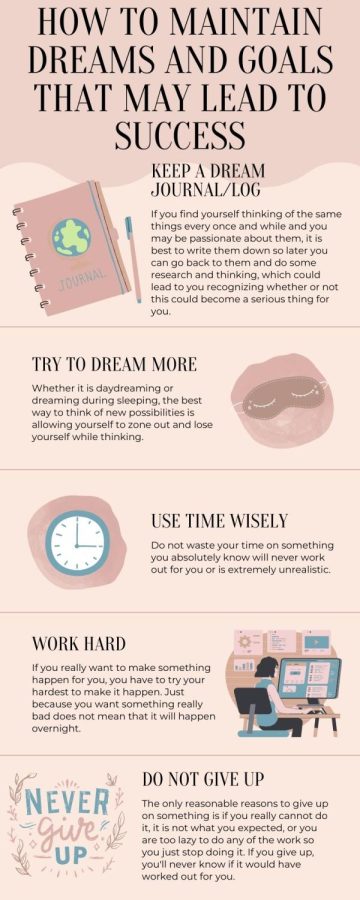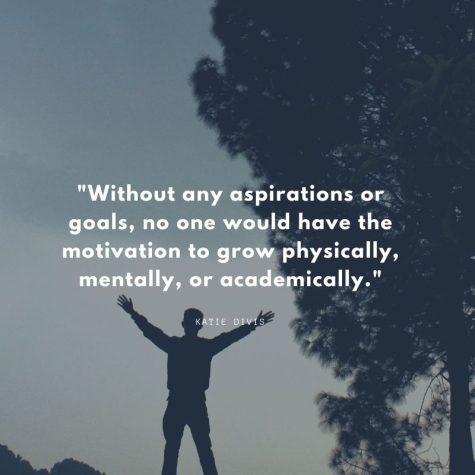How dreams and aspirations lead to success
May 18, 2022
Success means different things to different people. Success and accomplishments function hand in hand, and they refer to the accomplishment of a goal or purpose that someone may have. People should not give up on the hope that their dreams may come true and lead them to success. People mistake success for much more complex ideas or even mistake it for things of less value such as small campaigns or volunteer organizations that only train people for the hard work involved with their dream.
The main route for people to become successful comes from them having dreams, goals and passion. Working on one’s goals helps them secure success for the future. Working usually leads to accomplishments, as nothing happens efficiently without work and time spent dedicated to helping the growth of that goal. When putting effort into something, the progress and final product will reflect on the work invested into it. Work has led most people to great things. For example, in a work scenario, the only way to earn a great position where employers pay better and allow extra privileges, one must work hard and efficiently to move to the top.

A certain environment, like a work environment with multiple aspects and things to do, may confuse or trick one into thinking that the outcome they want is not possible to achieve. Generally in life, the type of situation that people live and work in forms different points of view and opinions. This leads to conflicts and arguments and everything that may prove someone’s point that success could never possibly work. If someone believes that success rarely happens, science makes their belief incorrect. Work does not just require physicality.
Work, the more efficient way to earn something that someone may want, impacts a significant amount of the population in different ways. Most people think that when one says ‘dreams lead the way to success,’ they mean they hope that one day something that they want to happen will happen because of their devoted dreaming. Working for something, or even working to rise closer to something anyone strives for remains the most efficient way to work toward a goal or aspiration. Workplaces have changed majorly since the early 2000s and before. Back then, based on the poor economic environment which included payment problems, commute problems and other issues, employers would hire the most efficient employees for their brand. Major companies hired with higher expectations throughout the process of hiring and proved that it remained extremely hard to join a company or even a program for a brand because of the lack of experience found in applicants.
“Dreams give people a major increase in chances for success. One’s dreams lead them to their goal. In order to follow one’s dreams, they need to identify the things that may help them achieve that dream quickly and efficiently,” former psychologist Aura Sotomayor said.
The inspiration that comes with dreams may also come from a person’s loved ones, friends, family or even school. While a handful of people in the world think that school only teaches students academics and skills sufficient to use in jobs involving math or science, school sometimes teaches students to find their voices. If students choose to attend college, university, or further education in something higher quality than high school, they tend to apply in August of their senior year of high school. Throughout the three years of high school before senior year, students may choose their electives for the next year. Students usually receive a summary of the classes from counselors, teachers and sometimes peers who took the classes before. If a school does not have the elective or class that a student might want to prepare for their ideal future career, schools usually offer clubs and teams that may lead into the field that a student wants. The alternatives for academic classes in schools may fit right for a student’s future career and they may not even know it.
“I feel like in high school when everyone thinks of their futures, they never realize that they’re building it at the time. Everyone either thinks they have all the time in the world, or they have no time left at all. All everyone needs to do is think about what they want or dream to do in order to be happy in the future,” freshman Addison Hill said.
Attaining dreams and maintaining dreams have multiple differences. Attaining dreams comes first as it remains the first step to having an achievement. Maintaining a dream includes other factors other than still having the same dream for a while. In order to keep a dream, one must have hope, patience and optimism. The most common misconception of staying with a dream usually portrays someone only having time or space for it, or even seeming scared to give it up and move on to another. Some people think that giving up on a dream may come off as losing hope. This may seem possible, but it might turn out as someone just finding a new dream, which remains fine as long as it does not constantly happen. Constantly changing may mean one might come off as unstable at making decisions or truly does not know what they may want.
When one gives up, it may lead them to believe they cannot do anything else. It makes them feel as though they failed the one thing they spent time on or the one thing they truly thought they could achieve. Maintaining hope and positivity steers people away from this feeling. Sometimes if a dream does not work out for someone after they accomplished every aspect of it or if one person accidentally messes up a valuable part of the process to accomplish their dreams, it could feel heartbreaking and lead them to not try to attain another dream, potentially leading to further mental health concerns.



















